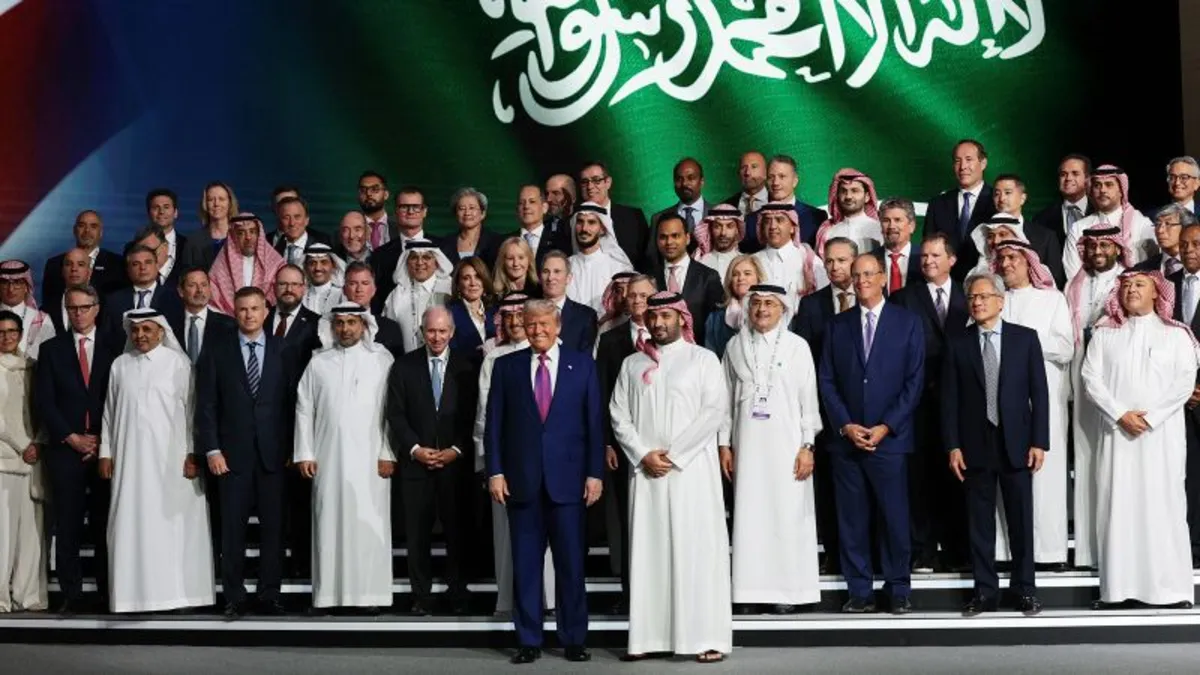
US President Donald Trump made headlines with his first international trip of his second term, showcasing a robust agenda filled with significant economic deals. Accompanying him were nearly three dozen CEOs from some of America’s largest corporations, including prominent names in Big Tech. Collectively, they signed agreements worth an astounding $600 billion, signaling a major shift in international business dynamics.
Central to these agreements were advanced artificial intelligence (AI) chips, essential for powering the Middle East’s most ambitious tech infrastructure projects. These initiatives are crucial for the region as it transitions away from an oil-dependent economy. The focus on AI technology underscores its importance as a strategic asset for the United States in fostering diplomatic relations, particularly with Gulf nations such as Saudi Arabia.
In a notable display of camaraderie, tech leaders including Elon Musk, Sam Altman from OpenAI, Jensen Huang from Nvidia, and Arvind Krishna of IBM, were part of Trump's entourage during his visit to Saudi Arabia. His arrival was met with a warm welcome from the kingdom's crown prince, Mohammed bin Salman, who rolled out the royal purple carpet for the US President.
This visit marks a significant departure from the previous administration's stance. Former President Joe Biden had vowed to isolate Saudi Arabia, particularly after the controversial murder of journalist Jamal Khashoggi in 2018, which US intelligence linked to the crown prince. As Trump embarks on this diplomatic journey, he aims to re-establish strong ties with Saudi Arabia and other Gulf nations.
In a prelude to his Gulf tour, the Trump administration announced the lifting of certain Biden-era restrictions that previously limited the export of AI chips to foreign adversaries. This decision paves the way for enhanced cooperation in the burgeoning field of AI technology.
The White House heralded the agreements signed during Trump's visit as historic, stating they represent “a new golden era of partnership between the United States and Saudi Arabia.” Despite being the world’s leading oil exporter, Saudi Arabia is actively investing in diversifying its economy. This effort is encapsulated in its ambitious Vision 2030 plan, which aims to modernize the kingdom and reduce its reliance on oil.
As part of this strategy, Saudi Arabia’s Public Investment Fund has established the AI startup Humain. This initiative is aimed at positioning the kingdom as a competitive player in the global AI market. On the first day of Trump's visit, Nvidia announced a strategic partnership with Humain to create AI factories in Saudi Arabia, projected to have a capacity of up to 500 megawatts. This collaboration will involve the sale of hundreds of thousands of advanced graphic processing units over the next five years, starting with an initial shipment of 18,000 top-tier GB300 Grace Blackwell chips.
Other tech giants are also joining the fray. AMD, under the leadership of CEO Lisa Su, unveiled a substantial $10 billion deal with Humain to develop robust AI infrastructure. Meanwhile, Qualcomm has separately entered into an agreement to provide advanced AI data centers to the startup. According to Keith Strier, senior vice president of global AI markets at AMD, Humain is keen on avoiding dependency on a single vendor for its AI hardware needs.
Following his Saudi Arabia visit, Trump is scheduled to travel to Qatar and the United Arab Emirates, both of which have their own aspirations to become leaders in the tech arena. The UAE has been proactive in its AI initiatives, appointing the world’s first AI minister in 2017. Recently, Microsoft made headlines with a $1.5 billion investment in G42, an AI group based in Abu Dhabi, which is chaired by a member of the ruling royal family.
In light of potential US chip sales to G42, the Trump administration is considering further economic engagements, despite previous congressional concerns regarding G42's alleged connections to Chinese military entities. G42 has denied these allegations and has taken steps to ensure compliance with US standards by severing ties with Chinese suppliers, including Huawei.
Trump's trip to Saudi Arabia signifies a pivotal moment in US foreign policy, particularly regarding economic partnerships centered on artificial intelligence. As the kingdom embarks on its Vision 2030 plan, the collaboration between American tech giants and Saudi Arabia represents both a strategic and economic opportunity for both nations, potentially reshaping the future of the Middle East.